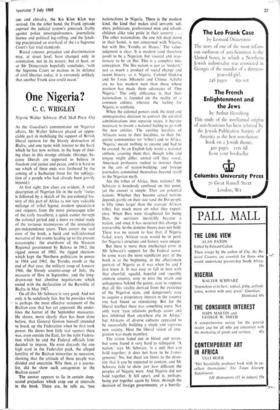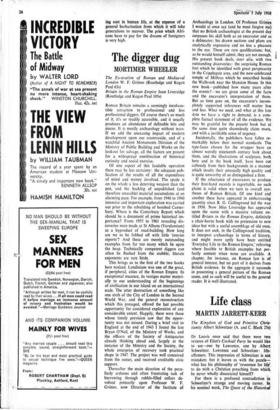One Nigeria?
C. C. WRIGLEY
Nigeria Walter Schwarz (Pall Mall Press 45s) As the Guardian's commentator on Nigerian affairs, Mr Walter Schwarz played an appre- ciable part in mobilising the support of British liberal opinion for the bloody destruction of Biafra, and one turns with interest to the book which he has now written, in the hope of find- ing clues to this strange attitude. (Strange, be- cause liberals are supposed to believe in freedom and justice and peace, and it is hard to see which of these ends was furthered by the arming of a barbarian force for the subjuga- tion of a people who had already been grossly injured.)
At first sight, few clues are evident. A vivid description of Nigerian life in the early 'sixties is followed by a sketch of the pre-colonial his- tory of this part of Africa (a not very valuable mélange of tribal legend, modern speculation and snippets from the more picturesque tales of the early travellers), a quick canter through the colonial period and a more ex-ended study of the tortuous manoeuvres of the immediate pre-independence years. Then comes the real core of the book, a lucid and well-informed narrative of the events leading up to the present catastrophe: the overthrow of the Western Regional government by Balewa in 1962, the rigged census of 1963, the rigged elections which kept the Northern politicians in power in 1964 and 1965, the Yoruba revolt, at the end of that year, the military coup of January 1966, the bloody counter-coup of July, the massacre of Ibos in September, and the long- drawn-out but abortive negotiations which ended with the declaration of the Republic of Biafra in May 1967.
On all this Mr Schwarz is very good. And not only is he sedulously fair, but he provides what
• is perhaps the most effective statement of the Biafran case that has yet appeared. He under- lines the horror of the September massacres. He shows, more clearly than has been done before, that General Gowon himself intended to break up the Federation when he first took 'power. He shows how little real support there was, even outside the East, for the tight Federa- tion which he and the Federal officials later decided to impose. He even discards the one high card in the Federalist pack, the alleged hostility of the Biafran minorities to secession, showing that the attitude of these people was divided and uncertain. Why then, as a journa- list, did he show such antagonism to the Biafran cause?
The answer appears to lie in certain deep- seated prejudices which crop out at intervals in the book. There are, he tells us, 'two
nationalisms in Nigeria. There is the modern kind, the kind that makes civil servants. sol- diers, politicians, professional men and school- children alike take pride in their country . . . The other nationalism, the one felt deep down in their bones, is not concerned with Nigeria, but with lbo, Yoruba or Hausa.' The value- judgment is clear. It is modern (and therefore good) to be a Nigerian, but visceral and reac- tionary to be an lbo. This is a complete mis- conception. The lbo nation is just as 'modern,' just as much a product of social change and recent history, as is Nigeria. Colonel Ojukwu and Sir Louis Mbanefo and Chinua Achebe are no less modern men than those whose position has made them advocates of 'One Nigeria.' The only difference is that their nationalism is founded on the reality of a common culture, whereas the feeling for Nigeria is synthetic.
When the colonial powers took the tired and unimaginative decision to convert the colonial administrations into separate states, it became necessary to invent a national feeling to go with the new entities. The existing loyalties of Africans were to their localities, to their lin- guistic•communities (or 'tribes') and to Africa. 'Nigeria' meant nothing to anyone and had to be created. So an English lady wrote a national anthem, assuring them that, though tribe and tongue might differ, united still they stood; American professors rushed to instruct them in the arts of nation-building; and foreign journalists committed themselves beyond recall to the Nigerian myth.
Are the tribes of Africa, then, nations? Mr Schwarz is hopelessly confused on this point. yet the answer is simple. They are potential nations. Whether they become actual nations depends partly on their size (and the Iho people is fifty times larger than the average African tribe), but much more on what they experi- ence. When Ibos were slaughtered for being Ibos, the survivors inevitably became a nation, and once it has occurred this change is irreversible. So the domino theory does not hold. There was no reason to fear that, if Nigeria failed, every African state would be in peril, for Nigeria's structure and history were unique.
But there is more than intellectual error in Mr Schwarz's support for the Federal cause. In some ways the most significant part of the book is at the beginning, in the affectionate portrait of Nigeria as it was when he and I first knew it. It was easy to fall in love with that cheerful, squalid, hopeful and superbly animate country, easy to miss the strain and unhappiness behind the gaiety, easy to suppose that all this vitality derived from the existence of the Nigerian state, and dangerously easy to acquire a proprietary interest in the country one had found so stimulating. But for the liberal intellect there was something more. Not only were 'race relations perhaps easier and less inhibited than anywhere else in Africa.' but Africans of diverse cultures appeared to be successfully building a single and vigorous new society. Here the liberal vision of inte- gration was made manifest.
The vision faded out in blood and terror, but some found it very hard to relinquish. 'A nation,' says Mr Schwarz, 'is a unit that can hold together; it does not have to be homo- geneous.' No, but there are limits to the diver- sity that it can be expected to contain, and Mr Schwarz fails to show just how different the peoples of Nigeria were. And Nigeria did not hold together. It fell apart, and is, perhaps, being put together again by force, through the decision of foreign governments, at a horrify- ing cost in human life, at the expense of a general barbarisation from which it will take generations to recover. The price which Afri- cans have to pay for the dreams of foreigners is very high.











































 Previous page
Previous page